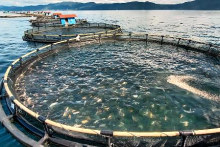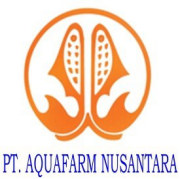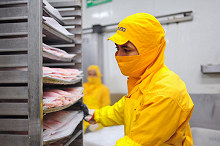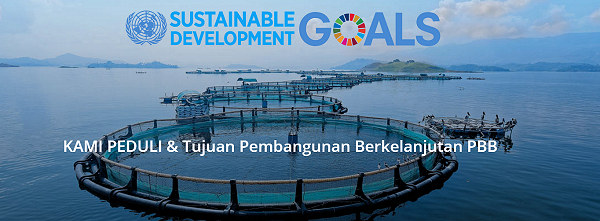Planning and operation
General production conditions
 The
Regal Springs farm produces its own fingerlings and market sized Tilapia.
The
Regal Springs farm produces its own fingerlings and market sized Tilapia.
Stocking density is 60 fingerlings per m3, equivalent to 90,000 fingerlings per cage. Feeding commences on the second day – depending on temperature and fish condition. Feeding is by hand ad libitum, with feed distributed from floating feed stores adjacent to cage groups. This allows for close monitoring of fish health. The first seven days post transfer are particularly critical as any fish damaged during transit may develop fungal disease.
Floating feed is used, with pellet size adjusted to the size of the mouth gape of the fish:
- 5 - 15g fish fed with 2 mm pellets
- 15- 160g fish fed with 3 mm pellets
- 1160g to harvest fed with 4 and 5 mm pellets
Feeding 10 12 times daily between 0900hrs 1700hrs. Feeding is halted during rain storms and is reduced if there are any disease outbreaks.
Sampling is done every 2 weeks to determine average weight, growth, quality evaluation and feeding rate. 2 to 3 % of the population is sampled. Parameters are average daily growth (ADG), feed conversion rate (FCR) and mortality percentage. This data is used to revise the feed amounts and calculate future requirements.
In 2014 the main disease issues were fungus, parasites and bacterial diseases (mainly streptococcus). Control of biosecurity is problematic in a large water body such as Lake Toba, particularly when there are other farms operating. In terms of disease introduction from other areas the main vectors are thought to be birds (especially cranes) and humans. All mortalities are removed from the cages and returned to the shorebase for proper disposal.
Routine site maintenance includes ensuring the immediate environment is kept clean from aquatic plants and plastic debris.
Production and harvesting plan
 Tilapia fingerlings are supplied
from the Company’s pond-based
hatchery and nursery farm at Serdang
Berdegai , North Sumatra. These are generally between 15 and 20g in
weight. From stocking with 20g to harvest takes 210 days. The weight
at harvest weight is 1.1- 1.2 kg per individual. Each cage can
produce 70 MT or approx. 40 kg per m3. The harvested fish are packed
in 12 m3 boxes with oxygenation. Fish are transferred from the cage
to tanks holding approx. 2.8 MT each. The density is about 2500 fish
per m3 for a 6 hour journey. The fish are fasted for 3 days before
delivery.
Tilapia fingerlings are supplied
from the Company’s pond-based
hatchery and nursery farm at Serdang
Berdegai , North Sumatra. These are generally between 15 and 20g in
weight. From stocking with 20g to harvest takes 210 days. The weight
at harvest weight is 1.1- 1.2 kg per individual. Each cage can
produce 70 MT or approx. 40 kg per m3. The harvested fish are packed
in 12 m3 boxes with oxygenation. Fish are transferred from the cage
to tanks holding approx. 2.8 MT each. The density is about 2500 fish
per m3 for a 6 hour journey. The fish are fasted for 3 days before
delivery.
Fish processing
 Regal Springs is a vertically integrated business, they
operate an end-to-end Quality Assurance and Good Manufacturing
Practice model for managing safety, quality, traceability,
harvesting, processing and finished product standards.
Regal Springs is a vertically integrated business, they
operate an end-to-end Quality Assurance and Good Manufacturing
Practice model for managing safety, quality, traceability,
harvesting, processing and finished product standards.
The Hazard Analysis Critical Control Point (HACCP or HAZOPS) system is adopted throughout our harvesting and processing sites. The processing plants in Honduras, Indonesia and Mexico conform to all relevant local and national regulations as well as those additional standards that Regal Springs sets for processing our Naturally Better Tilapia and selling into market.
The fish are brought live to the plants from the nearby lakes and are processed within hours. Each individual Naturally Better Tilapia we process is hand-filleted, trimmed, inspected and packed ready to cook. The teams are trained to implement our Regal Springs standards, which include meeting all the applicable regulations in the countries Regal Springs operate in, and are trained to comply with health and safety requirements.
Global farming operations
Global farming operations are overseen by the Chief Operating Officer (Farming) who reports directly to the Chief Executive Officer (CEO). Main areas of responsibility and work tasks are:
- Ensure that a safe working environment exists for all employees and that as a minimum the whole business meets the standards set out in the Group Health & Safety policy
- You will have a “living” operational strategy that reflects the overall business strategy
- Achieve the highest food safety and quality standards that are embedded throughout the business
- Responsible for the Regal Springs overall feed purchase, and to maximize the cost / benefit of this
- Secure that the appropriate team structures are in place, and are resourced by the right quality of people who reflect the Regal Springs values and the needs of the business
- Ensure that the training and development of individuals is owned by the operational teams to enable progress, promote growth or to replace current roles
- Develop appropriate KPIs that are cascaded through the operational teams
- Ensure that these KPIs are used at all levels to improve business performance
- Formulate and agree the operations revenue and capital expenditure budget plans.
- Control the total revenue expenditure to meet or improve the budget, and control the authorised capital expenditure
- Deliver change management programmes within the business to improve business performance
- Developing and managing Corporate strategies for Genetics, Vaccination and Feed Formulation
- Representing the Group internationally in areas such as Water Stewardship, Fish Welfare
- Create and maintain an environment where individuals are able to continually challenge the status quo, take measured risks and are encouraged to embrace change consistent with the Regal Springs Values

The Regal Springs "WE CARE" Integrated Sustainability Program is the world’s first totally integrated sustainability program for a vertically integrated white fish farming and Tilapia business. Regal Springs "WE CARE" has been set over a five-year period to 2023, and acts as a unifying force across the business to drive continuous progress across all our operations.